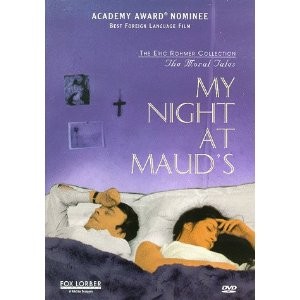The Top 5 Films by Eric Rohmer

Eric Rohmer, one of the founders of the New Wave, died in January at the age of 89. His unique style, emphasizing dialogue over action, earned him the ultimate homage: the adjective rohmerien, now part of the French language.
PHILOSOPHICAL TALE
Ma Nuit Chez Maud (My Night at Maud’s) 1969
This is the third title in Rohmer’s Six Contes Moraux (Six Moral Tales). In each of the six films, a man who is married or in love with a woman finds himself tempted to stray, but is ultimately able to resist. Jean-Louis (Jean-Louis Trintignant) is a Catholic engineer who has fallen in love with a young woman from his church parish but hasn’t yet worked up the courage to approach her. One evening, an atheist friend takes him to the apartment of his mistress, Maud, an attractive, free-thinking divorcée (Françoise Fabian), and leaves the two of them alone. During a night of unfulfilled sexual tension, Jean-Louis and Maud discuss philosophy and religion, in particular whether Pascal’s Wager can be applied to other aspects of life. (The 17th-century French philosopher Blaise Pascal suggested that, although the existence of God cannot be proved, we should bet that God exists, as we have everything to gain and nothing to lose by living life accordingly.) In the morning Jean-Louis leaves Maud, determined to talk to the woman he loves. With its witty, intelligent dialogue and intense on-screen chemistry between Fabian and Trintignant, Ma Nuit Chez Maud was nominated for Oscars in two categories.
HUMOROUS ROMANCE
Le Genou de Claire (Claire’s Knee) 1970
In the fourth of his Six Contes Moraux, Rohmer pursues his observations on male-female relationships, love and fidelity. A 35-year-old diplomat, Jérôme (New Wave darling Jean-Claude Brialy), vacationing in Annecy without his fiancée, meets Claire, the teenage daughter of a friend, and becomes obsessed with her right knee. Jérôme is determined not to succumb to his almost fetishistic desire but ultimately fulfills his compulsion by placing his hand on the girl’s knee under the pretext of comforting her. Exhilarating and touching, Le Genou de Claire may be the most rohmerien of all his films.
EXQUISITE GEM
Le Rayon Vert (Summer) 1986
This gem is from another Rohmer series, Comédies et Proverbes. Delphine (Marie Rivière, one of Rohmer’s favorite actresses), a desperately romantic secretary, finds her vacation plans suddenly cancelled and ends up borrowing the apartment of a friend in Biarritz. There she becomes fascinated with Jules Verne’s novel Le Rayon Vert and the rare optical phenomenon called the “green flash”—when a burst of green light briefly appears above the sun as it sets into the sea. Her new interest leads her to the man of her dreams. The film won the Golden Lion Award at the Venice International Film Festival.
CHRISTMAS MIRACLE
Conte d’Hiver (A Tale of Winter) 1992
Félicie and Charles meet during a summer vacation in this film from Rohmer’s Contes des Quatre Saisons (Tales of the Four Seasons) cycle. Due to a mix-up while exchanging addresses, they are unable to reconnect, even though she is pregnant with his child. Five years later, now a hairdresser and the mother of a five-year-old boy, she cannot forget her first love. It’s Christmastime and Félicie, courted by two men who are urging her to make a decision, still believes that, against all odds, she and Charles will meet again. She believes she has everything to gain by living her life as if it will definitely happen, embracing Pascal’s Wager without ever having heard of it. A lighthearted, feel-good movie about faith in love.
HISTORICAL TETE-A-TETE
L’Anglaise et le Duc (The Lady and the Duke) 2001
One of four period dramas directed by Rohmer, L’Anglaise et le Duc is based on the real-life memoirs of Grace Elliott, a Scottish courtesan living in France who narrowly avoided death during the French Revolution. As chaos erupts, Grace insists on remaining in Paris, where she receives frequent visits from her former lover, the Duke of Orléans—cousin of Louis XVI and father of the future king Louis-Philippe—who has remained her closest friend and confidant. This costume drama is every frame a Rohmer film, full of passionate dialogue between a man and a woman with opposing views on the Revolution, while the events themselves unfold off-screen. The film makes striking use of hand-painted backgrounds digitally inserted as sets, so the scenes look like living paintings.
Find French films in our France Today bookstore.
Originally published in the March 2010 issue of France Today
Share to: Facebook Twitter LinkedIn Email



